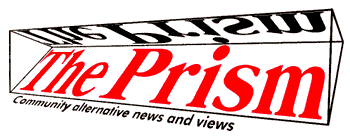about The Prism ||| volunteers ||| other sites

| December 1998 January 1999 Stories
|
by Robert Fikes, Jr. Surfing the Internet for leads for an article about African-American physicists serendipitously brought me to a website that featured some stunning facts about mathematics whiz kid Jonathan Farley, who at age 20 graduated summa cum laude from Harvard with the second-highest grade point average. Later, on full scholarship at Oxford University, Farley out-competed his peers to win the Senior Mathematical Prize and the Johnson Prize for research, and was awarded a doctorate in 1995. Thinking it would be an easy task to fill in some additional details, I searched in vain for news articles about Farley in scores of newspapers and magazines, including several published by African-Americans. The failure to locate material on him went beyond exasperation and anger; it was frightening to discover such an omission. How could someone like Jonathan Farley escape the notice of the press? The Farley matter, sad to say, indicates a broader problem: the news media's tendency to overlook young African-American role models. Peer example is what young people value most. And when national attention is given to an empirical study finding that black children in deprived urban areas too often equate academic striving with being "un-cool" and intellectual success with "acting white," one would hope that a more determined effort would be made to publicize young achievers in the community. Au contraire! Case in point: The day before Jody-Anne Maxwell became the first person of African descent to win the National Spelling Bee, another contestant, a four-time contest veteran who was the odds-on favorite to win, received a front-page, 1539-word profile in USA Today (5/27/98). (In contrast, Maxwell's perfunctory 225-word victory story two days later appeared on page 7 (5/29/98). In its reporting on the event, the New York Times (5/29/98) didn't even mention Maxwell's name until seven paragraphs into the article (page B5). Many major newspapers pushed the story a noticeable distance from the front pages, among them the Dallas Morning News (A30), Indianapolis Star (B6) and Boston Globe (C5). The San Diego Union-Tribune ignored the event altogether. And some of the nation's major black-owned newspapers, including the Los Angeles Sentinel, New York Amsterdam News and San Diego Voice & Viewpoint, either ignored or down-played Maxwell's history-making triumph. The case of Jody-Anne Maxwell is hardly the one example of the press missing a great opportunity to project a positive image of African-American youth to the nation and to those at-risk young people who need such role models the most. Seyi Fayanju of Vernon, NJ, another 12-year-old African-American, in 1996 won what is probably the second most prestigious prize an American child can be honored with: the National Geography Bee. He beat out 5 million kids competing across the land to take first prize, and soon thereafter the well-spoken youth appeared on Jay Leno's Tonight Show (6/5/98). But his treatment in the press closely mirrored Maxwell's. Similarly, in California, 13-year-old Christopher Drake's winning the state's spelling bee received scant attention. And only an attentive few reported the back-to-back high school national chess championships of Shearwood McClelland. Weary of complaining about the news media's seeming obsession with drive-by killing gangbangers, profanity-spewing misogynist rappers and wise-cracking young sitcom stars, black media watchdog groups formed in the 1980s to call attention to these unflattering images have mostly faded from the scene. And there are still too few African-Americans in key position in newsrooms to make a difference—to promote more the positive, realistic and self-affirming news stories so many of us hunger for. Robert Fikes, Jr. is a librarian in California. Subscriptions to Extra! magazine are available for $19/year; call 800-847-3993. |
home |||
current issue |||
past stories
about The Prism |||
volunteers |||
other sites
Send comments to prism@metalab.unc.edu.